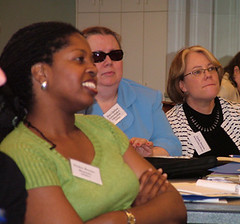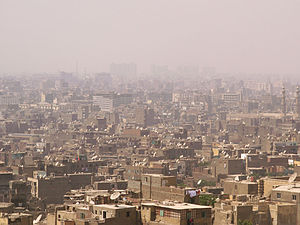If you have a blog and have linked to post ads on your blog, you know that some ads you'd rather not have. While all ads cannot be ruled out, some may be, due to the words you use or allow to be underlined in your blog.
For example, if I allow "Jesus Christ" to be underlined and linked to other resources, I am likely to see a Mormon ad ( the "church of Jesus Christ of latter day saints") somewhere on that blog, near the post.
Being in disagreement about Mormon teachings and their prime reference, the Book of Mormon, I prefer not to have their ads on my blogs.
The likelihood of that happening can dwindle if I choose not to add the link function for certain words or names in my blog posts.
How to stop those "fat stomach!!!" ads? If you find out, please let me know?
Wednesday, February 23, 2011
Tuesday, February 15, 2011
I wrote it, but ...what did I communicate?
 Image via Wikipedia
Image via WikipediaOpine Cafe and Books
I AM PRETTY SURE THAT I miscommunicated in recent emails to other writers whom I respect a lot. What to do? And, shouldn't I "know" better? To the latter question, the answer is "Yes, but," as in "Yes, but let's be honest: Is knowing the same as doing?"
Opinari Quarterly has a sidebar about a nerves-unsettling subject for many writers: Marketing. The sidebar reads:
"GOOD MARKETING IS....GOOD COMMUNICATION,
RELIABLE, TIMELY, and EFFECTIVE COMMUNICATION... about SOMETHING of VALUE."
I wrote that. And, I capped the words not to shout but to stress the importance of good communication. In this case, the adjective good is essential groundwork to describe the rest: marketing that is reliable, timely, effective ... to communicate about something of value.
A few years ago, I did lots of rewrites to develop that definition, and felt pretty good about it.
However, recently I have not been communicating well with others, I think. How common is this failure?, I now wonder, especially when trying to express "something of value" to people I value even more! Yet, I did it, I'm pretty sure;
I communicated unclearly, mainly because I did it too quickly, and so in the end it was probably an ineffective mess! Rereading my communiques, I can imagine run-amok reactions that ran from puzzlement into uncertainty and landed in confusion...or worse.
What to do? I'm trying to sort things out. I've rethought the changes I communicated, revised the plan, and started over, with queries to discover if my earlier emails did leave a lot lacking. No human can
communicate perfectly or even outstandingly all the time; that's too high a standard to expect. In the end, then, there is one thing we can and must do, which is to try again. Maybe those we've puzzled, confused, or worse will understand. We hope so.
It takes less time to do a thing right than to explain why you did it wrong. -Henry Wadsworth Longfellow *
*Source: Best Quotes
Thanks to: Wikipedia for the Creative Commons-licensed graphic.
Related articles (somewhat):
- Semantic Differential Questions - Semantic Differential Charts (wiscosurvey.com)
- "Word Craft" Column Offers Welcome Addition to Wall Street Journal (ishmaelscorner.com)
- Alexander McCall Smith Offers Quick Perspective On "Word Craft" Post (ishmaelscorner.com)
Labels:
blogs,
communication,
Opinari quarterly,
value,
writers
Friday, February 11, 2011
"A New...Newspaper!" from the Old, in Cairo, Egypt
 Image via Wikipedia
Image via Wikipedia |
| Al-Ahram Newspaper logo |
"...Mr Mubarak was dealt a significant setback as the state-controlled Al-Ahram, Egypt's second oldest newspaper and one of the most famous media publications in the Middle East, abandoned its long-standing position of slavish support for the regime.
"In a front-page leader, the newspaper's editor-in-chief, Osama Saraya hailed the 'nobility' of what he described as a 'revolution' and demanded that the government embark of irreversible constitutional and legislative changes."*
On BBC World News Television, Osama Saraya, editor in chief, smiled broadly and spoke enthusiastically as he spoke about the next few days of change in the newspaper: "a new...newspaper" changing in a country of "7,000 years of history," as one protester stated today. In Saraya's statement, there was no indication of fear that there might be military tampering with a leading government newspaper. Evident was a confident assumption that real change has come, including freedom of the press.
This indicates the editor's expectation that Al-Ahram will be free to report and editorialize about local and national events now, and will not fear being filtered as it follows and analyzes fluid movements in the air. This freedom free nations take for granted, and, as Davis Merritt wrote about in his book, Knightfall, there has been a change in the West regarding "the role of the press in a democracy with the pressure to produce profits." Apparently, Egyptian journalists have yearned to be free to grapple with such problems. Now they expect more independence to do their work, and without fear. That is another part of the jubilant celebration and hope in Cairo and across Egypt on February 11, 2011.
* source: The Telegraph, UK, about Al-Ahram newspaper, Cairo.

Related articles
- Egyptian Reporter Dies After Being Shot During Clashes (foxnews.com)
- Egypt protesters fear revenge if Mubarak stays (msnbc.msn.com)
- The Two Sides of Egypt's Struggle (cbsnews.com)
- Magda Abu-Fadil: Media Key to Covering Egyptian Revolution (huffingtonpost.com)
Labels:
Al-Ahram,
constitutional change,
Editor,
Egypt,
freedom,
news,
newspaper,
Osama Saraya
Friday, February 4, 2011
American pressures on Egypt
 Protesters against President Mubarak's fifth term. Free documentation license. Image via Wikipedia
Protesters against President Mubarak's fifth term. Free documentation license. Image via Wikipediaby Jean Purcell
Egypt now is at the forefront of crisis, a land of the Nile, the world's longest river, and a largely Muslim population (about six to ten percent Christian or other), past pharaohs, present beauty and Arab context, and...a long-standing dictator, President Hosni Mubarak. To what extent should the US leadership comment on Egypt's present crisis of power? Should it again use different high-level voices to deliver differing messages, some hinting at psychological-political coercion? Is this the right situation for such diplomatic styles? Should US leadership again try to dictate, or again apply public pressure on, the internal affairs of another sovereign nation?
Egypt is a nation of heavy-hitting political and religious powers. Significant numbers of its population are rising up and protesting, demanding political, national, and individual freedoms long denied to them. The problem of the answer being framed by the US goes beyond Egyptian history, language, accomplishments, and geographical beauty. The depths of any answer are not easily or quickly plumbed. They affect the heart of a culture that is deep, rich, expressive, and deeply proud, for many good reasons. Is this national need for change a matter in which the US leadership should encourage and try to hearten the protesters in ways that stop short of American leadership lecturing the Egyptian leadership in front of the world?
Powers are working on all sides, some good and some not, in the forefront and behind the scenes. Who is wearing a mask, speaking with deceitful intent and who is risking the right to be "out there" with honest hopes and dreams for better opportunities free of fear?
Egypt is a nation of heavy-hitting political and religious powers. Significant numbers of its population are rising up and protesting, demanding political, national, and individual freedoms long denied to them. The problem of the answer being framed by the US goes beyond Egyptian history, language, accomplishments, and geographical beauty. The depths of any answer are not easily or quickly plumbed. They affect the heart of a culture that is deep, rich, expressive, and deeply proud, for many good reasons. Is this national need for change a matter in which the US leadership should encourage and try to hearten the protesters in ways that stop short of American leadership lecturing the Egyptian leadership in front of the world?
Powers are working on all sides, some good and some not, in the forefront and behind the scenes. Who is wearing a mask, speaking with deceitful intent and who is risking the right to be "out there" with honest hopes and dreams for better opportunities free of fear?
In the best and worst situations, nations and cultures have an intrinsic array of thought patterns that guide the present and future. This array can create powerful and unique currents out of crises, currents that can carry forward for good or lead to further stagnation or damming up of events. One outside nation intending to guide another nation's decisions and outcomes in full view must do so knowledgeably and with careful abilities to apply pressure correctly, at the right place and time. Moratorium, dictating of terms, or applied pressure for other nations' desired outcomes will not work apart from great risk of achieving little more than undesirable, or even dangerous, long-terms results.
US leadership is trying to overlay American solutions onto Egyptian events. US thinking and method could easily create a seemingly good plan that is actually explosive, with painful reverberations in the region and around the world. One hopes not. One wishes that daring rhetoric might carry the day, but one wonders, "Is not the stake very high, to pressure something that one cannot 'fix' if it backfires now or later, the shards hitting others, not one's self?"
Are America's foreign policy analysts and experts paying enough attention t0 the complexities of Egypt's norms and the undercurrents?
One obvious example is "loss of face," an extreme anathema to an Egyptian of power. An American Nixon or Clinton may be willing to endure losing face at home. Would an Egyptian president like Mubarak willingly risk losing face in the eyes of the world if he perceived himself coerced from without, not within his homeland? Unwilling, should he be strong-armed by the leadership of the free world, an outside nation, and other foreign, western pressures?
Do Americans in charge at home understand the importance of what losing face means to an Egyptian? Are they fully aware to risk horrible long-term outcomes?
Understandably, many Egyptians oppose their president-ruler by speaking, risking, protesting, demanding, and insisting...all in the strongest terms. Those actions are citizen-rights that are assumed and also are inspiring or dismaying many inside and outside Egypt.
Unfortunately, American decision-makers at highest levels of the US government, from the president and secretary of state have come to the point of insisting, dictating, or dealing for an outcome desired in the US rather than an outcome reached in Egypt. After the outcome, Americans would not be there to implement, clearly, or to control the consequences.
Are these risks and behaviors that the American government should exhibit? With little time given to say, "We're following the situation closely," conflicting views and answers came from the highest levels of the US government. With little moment given to waiting, watching, and evaluating beyond and behind the obvious, it appears, judgments were jumped into very quickly and, possibly, carelessly.
The best intentions, the best and brightest minds can lead us wrongly. We have learned this as Americans. The best people can get it all wrong. This is not a political matter, but one of good governance and leadership.
The US should rethink, restudy, and get fresh and broader insight from others not yet consulted. At this hour, the Egyptian military holds the line in Cairo and elsewhere in Egypt as no other entity can. Let's hope they, too, proceed wisely, intelligently, and with thought to consequences. In specific ways, Egypt appears to be changing now, overnight, for the better.
However, the final scene has not yet been played. The process needs to lead to better, not worse, outcomes. The specter of Cuba during revolution, what was expected and what actually slid into place, hovers in the mind. It is good that today President Obama's tone softened regarding the insistent outcomes and who shall decide them, while more resolved regarding the safety of protesters, activists, and the press.
Related articles to read and assess:
- US intel missed Tunisia, Egypt uprisings (hotair.com)
- Alarmed by Cairo - Mullen: Egypt took me 'by surprise' (politico.com)
- Iran's Khamenei praises Egyptian protesters, declares 'Islamic awakening' - Christian Science Monitor (news.google.com)
- Foreign Policy: A Lost Chance For Democracy In Egypt (npr.org)
- White House: Mubarak has chance to show who he is (seattletimes.nwsource.com)
- Mubarak Firms Up His Grip on Power (themoderatevoice.com)
- US in Talks With Egypt for Mubarak to Resign Immediately - Voice of America (news.google.com)
- Iran Praises Parallels of Egypt's "Islamic Awakening" Protests (waronterrornews.typepad.com)
Labels:
answers,
best and brightest,
crisis,
culture,
Egypt,
governments,
leadership,
loss of face,
Mubarak,
nations,
protests
Be Ready to Give Answers




Whatever we are doing, we need to be ready to describe it succinctly and to tell why we do it, if we enjoy it, why, and if we find it difficult, and why, and other questions that are often part of our own inner dialogue about what's going on in our lives.
I work with writers, and also I write. It is important to prepare written descriptions and to be ready to answer orally, depending on the inquiring media, whether print, web site and blog information ("about" tabs), and for anyone that interviews you for print, audio, or visual media:
Be ready to answer key questions. You do not want to have to think as you answer. You want to be ready to remember what your answers really are, before the questions are asked.
Be ready to give the same or similar answers every time.
What kind of writing do you do?
Short answer examples: The genres/categories of your writing-fiction, nonfiction, or personal narrative.
Longer answer examples: If fiction/ based on a true story, or romance fiction, or adventure fiction, or historical fiction, or mystery, or children's, for example; if nonfiction, for example: how-to, essays, book (or movie) reviews, op-eds, news (or public interest) columns, biography, general information about...
What is your book about?
Short answer example: You can choose from the genres above, with a little information: It's a novel about a family/navy,WWII, love and hate....use your information to its best advantage to spark interest.
Expanded answer example: It's a novel about two brothers caught up in a competition that threatens to destroy not only them but their community/corps/secret society....choose the best and most interesting and informative words that best describe the true central theme of the story.
Another good example: Read the beginning of "'Mumbai Diaries' Review" in Related Articles at the end of this blog post! Notice how the words carefully selected to describe the 'about' flow to create interest.
How long did it take you to write it?
Are you working on anything else now? What are you working on now? Answer this kind of question in a way that will spark interest yet will not deflect interest from the present work. Refer back to the last published work and continue on its theme or title.
What helped you the most in the writing of this book (article/series, etc.)? Or, What kind of research did you have to do?
How did the idea come to you, to write about this?
How did the characters come to you, especially the villain? Is he/she modeled on someone you know?

What do you most enjoy about writing, and why?
What is most challenging for you, as a writer?
How are sales going? This is a very personal question. If you have a publisher, defer to the publisher, who keeps the numbers. But speak positively about the potential for interest in this book and why people should read it.
Why should I read this book? Why should anyone read this book? This is your chance to be ready, to answer clearly and concisely. For example: I wrote to tell a story that intrigued me. I wrote to bring the reader into it along with the characters (name two key ones, perhaps), and to keep the pages turning with increased interest.
Most of all, take your time, having prepared in advance with answers that are accurate, interesting, and, perhaps, entertaining. Be ready to open yourself up without being wordy and without faltering. You should not have that shocked expression, as if you had never thought about the questions you might get.
Every interview, every summary you write, and every mission statement or book/article description you do for yourself will help prepare you for these moments. Opportunities may come at unexpected times, when a stranger in a group after a meeting or at a get together will ask similar questions of interest.
Be true, be interesting, and be ready!
Related Articles
- Fiction + Research (twowritingteachers.wordpress.com)
- How to Do a Genre Study with Young Students (brighthub.com)
- The Top Ten Colleges for Writers in the US (brighthub.com)
- who says i have to write??? oh yeah...that's right...I did!!! (haight68ashbury.com)
- Blaze through nonfiction books like butter (freakrevolution.com)
- 'Mumbai Diaries' review: a long way from Bollywood (sfgate.com)
Labels:
analytical thinking,
authors,
bookmarketing,
books,
fiction,
how-to,
interview,
mission,
mystery,
nonfiction,
novel,
writing
Thursday, February 3, 2011
Journalism When Fear and Dangers Come
2/3/11 Thursday, 1:23 AM EST
Jean Purcell
Opine Cafe and Books
Opinion
What is the response of the Christian writer or journalist when crises explode and we learn more about the world due to these crises?
As writers and as regular viewers tonight, you and I are either far from the increasingly explosive events in Cairo tonight, and we are safe; or, we are in the middle of it. Tonight, journalists of print, digital, and visual media and their cohorts - producers, photo journalists, camera operators, in some cases - are risking their lives to cover these events by sight and by camera and microphone. There is no doubt they do this because it what they love to do, yet often they are hearing and seeing dangerously close at hand, touched by it at different levels of thought and experience..
In these somewhat cynical times of suspicion of many professionals, we know the reasons we have become skeptical about news reporting. We have been led to believe lies due to intentional twisting of stories due to injections of journalistic commentary and personal politics of journalists.
But there is much more to journalism than that, and it is very likely that many journalists have grown up, in the sense that they became dismayed and even embarrassed by their peers who were using "news" for personal or career gain.
Tonight, journalists are reporting through the night, many of them in danger, even if they are not in the streets but are broadcasting or reporting in from close quarters where they have been told to wait.
If safe, we pray for peace in Cairo and we pray for those citizens and outsiders all over Egypt who share the distress in their own ways and for their own reasons. Now, US citizens are being encouraged to leave immediately. "Further delay is inadvisable," according to CNN's crew sitting in the dark, in a closed in place, reporting the events they are witnessing close up. Pray for journalists and their families back home or preparing, from Egypt, to return to the USA without them, according to family agreements.
If in the middle of things, it is important to aim for honesty, care, and continual internal prayer as things evolve. The best journalists, in my view, aim to be real and react out of more than personal attention or safety. There is a concern for others evident in this way tonight, among journalists letting us into their world, a world away so to speak, via sound and camera equipment, satellites and other technologies. These requirements to react outside one's self seem to be part of the best of journalism. I thank God for that, too.
(c) Jean Purcell 2011
Related articles
- CNN anchor among journalists roughed up in Cairo (ctv.ca)
- Violence Against Journalists Reported in Cairo (cbsnews.com)
- Targeting Journalists For Violence In Egypt: Government Is "Eliminating Witnesses" (mediaite.com)
- "Egypt closes Al-Jazeera bureau as journalists come under increasing pressure" and related posts (blogs.pressgazette.co.uk)
- Israelis arrested in Cairo as Egypt protests continue (thejc.com)
- 4 French Journalists Released After Cairo Arrests (abcnews.go.com)
- Passion gives way to bloodshed in Cairo (bbc.co.uk)
- It's Early Morning In Cairo, And Pro-Mubarak Rioters Have Come Back With Live Fire (businessinsider.com)
Labels:
Cairo,
CNN,
crises,
danger,
Egypt,
journalism,
journalists,
protests,
writers
Tuesday, February 1, 2011
QUICK POST-Do you have a self-publishing Fall 2011 book release?
 Image by nancydowd via Flickr
Image by nancydowd via FlickrQUICK POST SELF-PUBLISHING TIP: Are You Planning to self-publish a book on a date between September and November 2011?
Now is the time to finish your personal book proposal, finish your editing, and tune up your marketing plan. Your marketing plan should implementation six months before your release date. Writer's Bag Books: Editing, Self-Publishing, Book Proposals, Marketing...and more.
Do it right!
QUICK TIP Source: Writer's Bag blog post on this topic
Read and assess Related Articles consistent with your needs:
- Ruth Ann Nordin posts her marketing plan (teleread.com)
- What's Your Plan? (terrywhalin.blogspot.com)
- New Virtual Training Teaches Aspiring Authors the Secrets of Getting Their Books Into Print--and Mistakes to Avoid Along the Way (prweb.com)
- Marketing Plan Audits: The First Step to Successful Strategy (samirbalwani.com)
- Aspiring Writers Resort to Self-Publishing (smudailymustang.com)
- Is your marketing plan for 2011 in great shape? (krishnade.com)
- What's The Difference Between Self Publishing and Vanity Publishing? (bizcovering.com)
- Author Solutions, Inc. Offers Tips on How Writers Can Become Published Authors in 2011 (prweb.com)
- Sample Marketing Plan Budget (brighthub.com)
Labels:
book marketing,
book proposals,
book release,
editing,
Fall 2011,
self-publishing,
tips,
writing
Subscribe to:
Posts (Atom)






